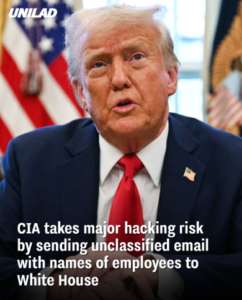The CIA has reportedly taken a major cybersecurity risk by sending an unclassified email to the White House containing the names of multiple agency employees. The move has sparked serious concerns about potential security breaches and the exposure of sensitive personnel information, especially given the ever-present threat of cyberattacks from foreign adversaries.
According to sources familiar with the matter, the email, which was not encrypted or marked as classified, included the names of several CIA officers. While the content of the message remains undisclosed, intelligence experts warn that even seemingly harmless personnel details could pose a serious threat if intercepted by hostile entities.
The CIA is known for its strict secrecy protocols, particularly when it comes to protecting the identities of its operatives. Many intelligence officers work undercover or handle classified operations, and any exposure of their identities—whether intentional or accidental—could have dangerous consequences. The agency usually relies on secure communication channels to relay sensitive information, making the decision to send an unclassified email particularly baffling to cybersecurity analysts.
Cybersecurity experts warn that such an oversight could open the door for malicious actors, including foreign intelligence agencies and hackers, to exploit the leaked information. Given that cyber threats against U.S. government agencies have been increasing in recent years, any lapse in security—especially one involving intelligence officials—raises red flags.
“The risk here isn’t just that someone could read the email,” said a former intelligence official. “The bigger concern is that adversaries like China, Russia, or Iran could be monitoring unclassified government communications, and this kind of information could be used to target CIA officers, track their movements, or compromise ongoing operations.”
The White House has not commented on the incident, and it remains unclear whether the email was sent in error or if it was an intentional decision made under specific circumstances. However, some intelligence insiders speculate that the email may have been part of routine interagency coordination, which sometimes involves passing along personnel details for official meetings or assignments.
Despite this, critics argue that the CIA should have taken better precautions. “This kind of mistake is inexcusable at a time when cyber warfare is one of the biggest threats to national security,” said a cybersecurity consultant. “Even if the email itself wasn’t classified, the names of intelligence personnel should never be shared over unsecured channels.”
The incident has also renewed concerns about the security of government communication systems. In recent years, multiple high-profile cyberattacks have exposed weaknesses in U.S. intelligence and defense agencies. The SolarWinds hack in 2020, allegedly carried out by Russian state-backed hackers, compromised several federal agencies, including parts of the Pentagon.
It is unclear whether any security measures have been taken in response to the unclassified email, but intelligence officials may now have to assess whether the employees mentioned in the message are at risk. If their identities were indeed compromised, the CIA could be forced to take protective measures, including reassignment or additional security protocols.
For now, the incident serves as a stark reminder that even a small misstep in handling sensitive information can create significant national security risks.

